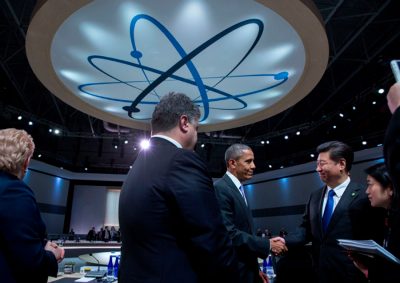SFS On Topic: Nuclear Security Summit

April 8, 2016 by Matt Ellison
From March 31 to April 1, 2016, world leaders met in Washington, D.C. for the 2016 Nuclear Security Summit (NSS 2016). This year’s summit, the fourth in a series of summits held every two years since 2010, convened representatives from more than fifty countries and four international organizations. The agenda for NSS 2016 consisted mainly of what tangible steps governments can take to keep nuclear materials secure—out of the hands of terrorists and other criminals. SFS faculty added their voices to the public conversation around the Summit.
Focus on Technical Issues Front at Summit
Professor Matthew Kroenig, Associate Professor of Government at SFS and a senior fellow at The Atlantic Council, provided context for the summit, explaining what he saw as the most important issues going into the summit. “Nonspecialists often assume that a ‘nuclear security’ summit will cover a broad range of nuclear issues including nuclear deterrence, arms control, and the North Korean and Iranian nuclear programs,” Professor Kroenig wrote.
In fact, Kroenig noted, the summits have focused on “unglamorous, but important issues” such as removing highly enriched uranium from civilian facilities and developing new methods to police nuclear material smuggling.
Preventing Nuclear Terrorism
Professor Irfan Nooruddin, Associate Professor at SFS, specializes in the study of comparative economic development and policymaking with a focus on India. Professor Nooruddin explained on CNBC that the main objective of the Nuclear Security Summit is ensuring that non-state actors like ISIS and al-Qaida cannot get access to nuclear materials.
"Having these states talk to each other about how they can protect their nuclear supplies is important," he said. "Prior to these summits, we didn’t have any format in which state leaders could come and share that information," Nooruddin added.
"I think that for Mr. Obama this will a very important part of his legacy—that he initiated and supported these conversations," Nooruddin said.
Plutonium Security Overlooked?
Professor Robert Gallucci offered his take on the implications of the current Nuclear Security Summit as a threat to international security in The Huffington Post. The former Dean of SFS, Professor Gallucci served many years in government including his role as the chief U.S. negotiator during the North Korean nuclear crisis of 1994. Gallucci was skeptical that the Summit would address access to plutonium, which he called a "game changer" for nuclear terrorism. "Indeed, plutonium and its vulnerability to theft are increasing," Gallucci wrote, "and this alone promises soon to utterly change the calculations about the probability of nuclear terrorism."
The reason for a lack of attention to plutonium access, according to Gallucci, is both a flawed underestimation of terrorist capabilities and geopolitical inconvenience. He wrote that governments rely on a belief that "plutonium is not useful for technical reasons of nuclear weapons design."
"Plutonium and its vulnerability to theft are increasing," Gallucci wrote, "and this alone promises soon to utterly change the calculations about the probability of nuclear terrorism."
When it comes to nuclear reprocessing (the process of separating usable plutonium from spent nuclear fuel), Gallucci noted, "it is hard to ask the French to forego the sale of their reprocessing plant to China." Difficult also, he explained, to stop China from building what Japan already has, Japan not to run a plant it has already built, and South Korea to forego keeping up, in terms of reprocessing technology, with China and Japan.
Efforts to block this spread of nuclear reprocessing technology would be to acknowledge that safeguards of nuclear facilities and materials "vary alarmingly from country to country, as do the capabilities of terrorists." A fact, according to Gallucci, that governments have been loathe to admit publicly.
Future of Nuclear Security Summit Uncertain
Professors Kroenig and Nooruddin both raised questions regarding the future of the nuclear security summit process, as President Obama leaves office.
Nooruddin said he was not "particularly optimistic" for this year's summit, given the noted absence from the summit of Russia and Iran. The future of this nuclear security framework is also uncertain, Nooruddin indicated, as President Obama will leave office in January. Despite these circumstances, Nooruddin said, "these are conversations that have to happen."
Kroenig noted the progress the Nuclear Security Summits have made, but he said that it remains uncertain what future holds for this framework. “These summits have advanced global nuclear security in a number of ways,” Kroenig wrote. “While past summits have accomplished much, more work remains to be done.” Kroenig explained that while President Obama has prioritized these summits, it is unlikely that his successor, whoever that is, will do the same. “It is hard to see the process continuing, therefore—at least in the current format.”

